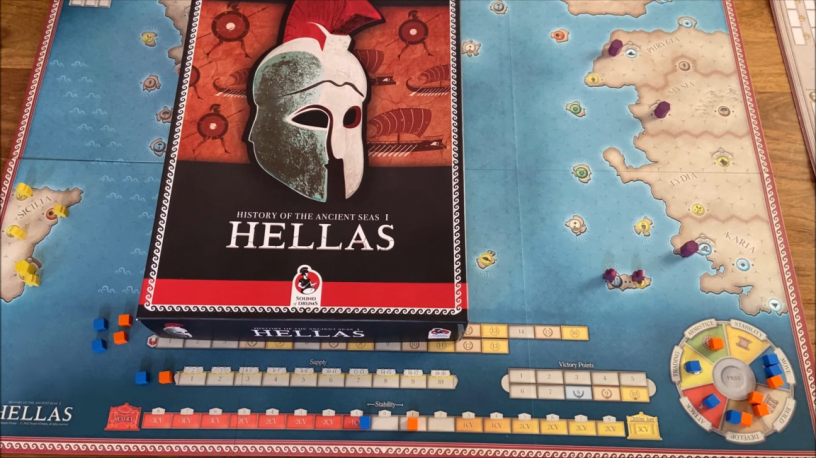This will be my second article on Hellas – the first part of the History of the Ancient Seas series. In the initial material I presented the main rules, victory conditions and general flow of the game. Today I would like to briefly discuss how that title looks in practice – simply by going through couple of session reports I had pleasure to play. Important note: the game is not published yet and should soon hit the crowdfunding platform.
But before we jump into the After Action Reports, a few sentences about the game itself – you can find that introduction also in below video material.
PS. For all willing to back the project on Kickstarter, here is the link: https://www.kickstarter.com/projects/soundofdrums/history-of-the-ancient-seas-relaunch
The Game
Brief game description:
In HELLAS, the first instalment in the History of the Ancient Seas game series, you will lead one of the great City States – Athens or Sparta. Your goal is to become the leading empire in known world. To achieve this, you will need to build armies and fleets to increase your military might, expand trade routes, conquer islands and provinces, develop your military skills, economic efficiency and culture, while always keeping an eye on the wealth, happiness and stability of your people.
The heart of the game system is the action cycle: The players choose one of the eight possible actions (kind of roundel mechanics). Actions chosen by a player can’t be chosen subsequently by the next player. The number of possible actions is limited each turn.
Peaceful or conflicting coexistence – that is truly your decision! You can expand your empire by leading your people to war. But war is costly and the outcome is uncertain. You can lead your empire to the golden age of civilization by keeping the peace and bringing stability and wealth to your people without following the path of war. Offer terms to aggressive enemies to distract or delay them, but always be prepared to defend your empire.
PUBLISHER PAGE
Sessions Report
My opponent in that game was Kuba, with whom I pretty often play various wargames. We rolled for the sides, and I got privilege to command Spartans while Kuba was in charge of Athens. This was our first session with that game and the expectations were high!
As always, you can click on any of below images to enlarge it in the new window.
Also, bear in mind that I played prototype version of the game – the final one will be definitely more polished one.
First Session





Second Session




First Impressions
That was really fun playing Hellas. We probably focused much more on War aspect of the game than we should – well, that is definitely our habit – but the economic dimension is equally important here. Let me share now my initial impressions about this position and what I think about it:
- I am history buff, and everything which touches Ancient Era, be it Greece, Rome or Persia is of great interest to me. And the theme is pretty nice and deep in that game – especially in Technology Tree and possibility to travel to Asia Minor and Sicily. You can feel that you actually play Ancient Greece.
- The action mechanic is very cleverly designed – only 3 actions of particular type per turn, no possibility to repeat what opponent just did and maximum 2 actions of same type per player. That creates fantastic strategic dilemmas, tension and ability to influence what the opponent can do.
- Even though components are not the final ones, I am glad publisher went with wooden cubes and large map which easily accommodates all the pieces.
- There is some counting involved – in your income, in number of particular type of resources you have, provinces, islands, etc. You really need to keep this up to date in every moment of the game which sometimes can be tedious. Still, I think this is just as much as I can take so I am fine with it.
To sum up, I enjoyed game pretty much. There are still some areas for improvement which I shared with designer and developer – in the end this is a prototype but a very advanced one. What is more, there are two more games in the works in the same series – for 3 and 4-5 players. I think the system can shine even more with more players!

